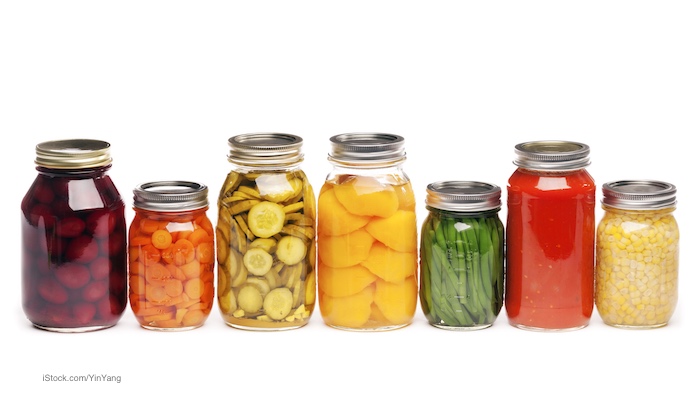If you have an overflowing garden, or if you frequent farmers’ markets, you know that it’s time to can produce. Do you know how to can safely?

Canning food, especially any low acid food such as vegetables, can be hazardous because of the pathogen Clostridium botulinum. This bacteria produces spores which grow under low acid, anaerobic conditions. The spores produce a toxin called botulism that can be deadly in very small quantities. So understanding and following proper canning methods is essential.
The National Center for Home Food Preservation is the best resource for anyone who wants to can food at home. The center was started by the Cooperative State Research and Extension Service, which is part of the USDA. That site has information on how to can food, freeze food, dry food, cure and smoke meats, how to ferment, pickle, make jams and jellies, and how to safely store your dried foods.
Many universities have extension services that are invaluable resources too. They include Penn State (which offers recorded webinars), the University of Minnesota, North Dakota State University, North Carolina State Extension, Utah State University Extension, Oregon State University Extension, and Cornell Cooperative Extension, among others. Contact your local college or university to see if they have resources; some offer in person classes.
The main thing to keep in mind is that everything should be as clean and sterilized as possible. You are trying to limit the growth of undesirable pathogens. The food must be washed before it is canned. Most foods should be “hot packed,” that is, packed with boiling liquid. Add acid to low-acid foods to reduce the pH and inhibit the growth of botulism spores, and use good quality jars and new self-sealing lids. Low acid foods must be processed in a boiling water bath or canned using a pressure canner for the correct amount of time.
The Clostridium botulinum spores produce the botulism toxin when they are in a moist, low-acid food (pH higher than 4.6) with a temperature between 40°F and 120°F, in an environment with less than 2% oxygen. These spores are naturally present on most fresh food surfaces. They are harmless on fresh foods because they are exposed to oxygen.
Low acid foods include all fresh vegetables except for tomatoes, but remember that some tomatoes may have a pH that is slightly higher than 4.6. Most mixtures of low acid and acidic foods have pH values above 4.6 unless the recipes have enough citric acid, lemon juice, or vinegar. Fruits, pickles, sauerkraut, jams, jellies, marmalades, and fruit butters are usually safe.
Low acid foods must be sterilized through pressure canning. The time required is usually 20 to 100 minutes; time for safely canning low acid foods in a boiling water canner is from 7 to 11 hours.
When you are canning, only use modern canning recipes. Older recipes may not be safe. Follow canning recipes rigorously. Make sure your jars are sterilized, and be careful not to contaminate them. Even accidentally putting your fingertip inside a jar can contaminate it.
Make sure the lids seal when you process the cans. Store them below 95°F; the best temperature to store these home canned foods is at 50°F to 70°F. There’s a reason your grandmother stored canned foods in the basement.
If you live at a high altitude, the rules change since water boils at lower temperatures, which makes it less effective for destroying pathogens. Contact your local university for information if you live at an altitude of 1000 feet or more.
Open-kettle canning and processing of jars in ovens, the microwave, and the dishwasher are not safe methods. And canning powders are useless as a preservative. Jars with wire bails and glass caps are not recommended for use in canning; neither are zinc caps that use flat rubber rings.
So follow guidelines carefully and you will be able to safely enjoy your home canned produce all through the winter.




